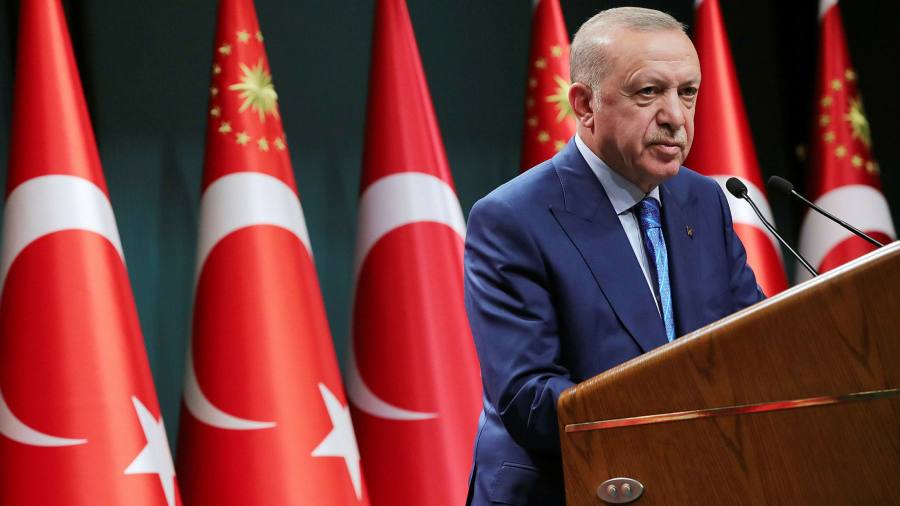Recep Tayyip Erdogan, Turkey’s imperious president, behaves more than ever as though there are no limits to his power — and at precisely the moment he is looking most vulnerable after two decades towering over Turkish politics.
So when year-on-year inflation reached close to 50 per cent last month, the highest of the Erdogan era, he fired the head of the Turkish Statistical Institute. Soaring food and energy prices, which are helping sink his ruling Justice and Development party (AKP) in the polls, were disobligingly unresponsive.
Erdogan’s power is unbounded, ever since he replaced Turkey’s parliamentary democracy with a Russia-style presidency. But imposing one-man rule has encouraged him to make reckless errors of judgment. Having dispensed with all the co-founders of the AKP and discarded all serious economic expertise, there is no longer anyone around him to say that the sultan has no clothes.
In October, he ordered the expulsion of 10 western ambassadors, including from the US, which would have finally sundered the fraying moorings Nato member Turkey has with the west. He backed away from the threat.
But he seems unable to back away from his ruinous economic policy, in particular a belief that raising interest rates causes rather than curbs inflation. He has bludgeoned the central bank — and a procession of sacked governors — to cut rates, sending the lira into a tailspin (44 per cent down last year against the dollar) and fuelling inflation.
Erdogan’s thirst for the economic growth that enabled him to spread prosperity, education and healthcare into the conservative heartland of Anatolia during his first decade in power was based on cheap credit, consumption and unbridled construction. This evaporated long before the pandemic. His failure to defend the lira despite burning through over $100bn in reserves leaves investors wondering whether Turkey will be able to service its debts.
This unchecked slide is at the heart of the opposition’s growing belief that it may finally be able to oust Erdogan and restore Turkey’s parliamentary democracy. The presidential elections are due in June next year. But the AKP, since it first gained power in November 2002, selling itself as a neo-Islamist analogue of European Christian democracy, has been on a permanent campaign footing ever since. It behaves simultaneously as an overbearing ruling party and a scrappy opposition fighting the secularist forces that deny it political legitimacy. And Erdogan could call an early contest in circumstances intended to wrongfoot challengers.
He has neutered parliament, weaponised the judiciary, populated almost all the media with placemen, and eviscerated the civil service. He has imprisoned the leadership of the leftwing, pro-Kurdish HDP that deprived the AKP of its parliamentary majority in 2015 — Erdogan re-ran the contest in a febrile atmosphere of revived war with Kurdish insurgents and a spate of jihadist atrocities.
Yet Erdogan has also hollowed out the leadership of the AKP — one of the most successful ruling parties of modern times. It is being abandoned by his core constituencies, but from the cocoon of his palaces he is insulated from intimations of political mortality.
The question, then, is whether the opposition can unify behind a viable candidate and set off an electoral wave he will not be able to resist. Many political analysts believe it can. “We are at the end of a major historical cycle in Turkey,” says one.
In 2019, after the AKP lost most of Turkey’s great cities in local elections, Erdogan tried to repeat 2015 with a rerun of the contest in Istanbul, the city at the heart of his mystique and where he had been mayor. Ekrem Imamoglu, of the centre-left Republican People’s party (CHP), the main opposition, won conclusively with a united opposition. So did Mansur Yavas in the capital, Ankara. Both now outpoll him as putative presidential candidates.
Kemal Kilicdaroglu, the CHP leader, as a member of the minority Alevi sect in mainly Sunni Turkey, almost certainly could not beat Erdogan. Some believe he is a decoy to protect genuine candidates from regime attacks (already there are sectarian stories that Yavas, who enjoys the biggest lead over Erdogan, is an undeclared Alevi).
The opposition grows in confidence that it can bring Erdogan down and bin his one-man rule. It will shortly announce plans as to how. It is hard to rig elections in Turkey. Less so to find a pretext for a state of emergency, or a provocation: such as declaring the officially secular state’s official religion is Islam, in the hope of splitting the opposition. This could get ugly.
By: David Gardner
Source: FT



